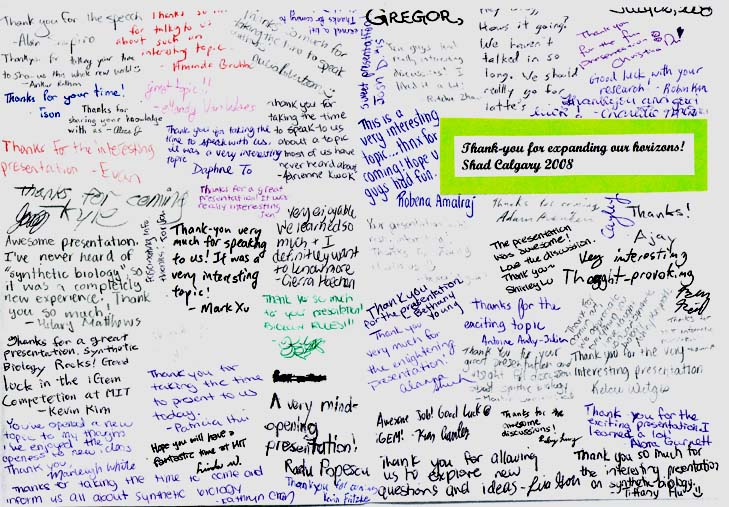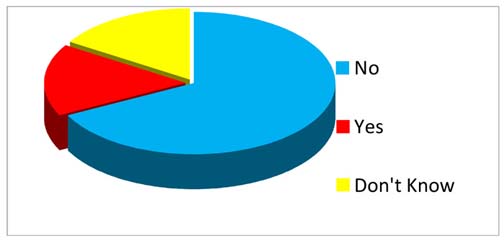Team:Calgary Ethics/High School Surveys
From 2008.igem.org
| Line 124: | Line 124: | ||
!align="center"|[[Team:Calgary_Ethics/Collaboration|Collaboration]] | !align="center"|[[Team:Calgary_Ethics/Collaboration|Collaboration]] | ||
!align="center"|[[Team:Calgary_Ethics/Future_Plans|Future Plans]] | !align="center"|[[Team:Calgary_Ethics/Future_Plans|Future Plans]] | ||
| + | !align="center"|[[Team:Calgary_Ethics/Acknowledgement |Acknowledgement]] | ||
!align="center"|[[Team:Calgary_Ethics/Notebook |Notebook]] | !align="center"|[[Team:Calgary_Ethics/Notebook |Notebook]] | ||
|} | |} | ||
Latest revision as of 19:41, 29 October 2008
 |
|
The Surveys: How much do people know about Synthetic Biology and what do they think about it?"As bioengineers continue to build things with the stuff of life itself, the rest of the world is slowly waking up to the power of synthetic biology." (Fong, 2008) With the rapid advancement of synthetic biology, there are many ethical issues associated that will become increasingly important. The general public is likely to be impacted by new developments in the field, yet most people are largely unaware of Synthetic Biology. One study found that more than 80% of Americans had heard little or nothing about the field (Braman, Kahan, Mandel, 2008.) Since Synthetic Biology has implications on a global scale, our team sought to get a comprehensive understanding of how members of different groups across many countries knew about synthetic biology and what their opinions were on the risks and benefits of the field. We developed two online surveys to target two main populations: The Adult Survey: Targeted members of NGO's, government, Industry, University (both faculty and students) and participants of the 2008 iGEM competition. The High School Survey: Targeted high school students participating in extra-curricular summer programs geared toward science and engineering. Both surveys were exploratory in nature. We relied mainly on open ended questions and provided only one general definition of synthetic biology at the beginning of the survey. This was done in an effort to minimize bias. Synbio: The Next GenerationThe High School SurveyTo get a sense as to where the field of synthetic biology may be headed, we surveyed high school students enrolled in science and engineering summer programs at the University of Calgary. We asked them how much they knew about synthetic biology, what their thoughts were on its implications and whether or not they would like a unit on Synthetic Biology in their high school curriculum. The ResultsClick the link to see all responses (media:High_School_Summary.pdf) .5% (30) of the students had previously heard of Synthetic biology Perceptions of Synthetic Biology:"It is a big step towards a better world" "The possibilities are endless" "It may revolutionize the human lifestyle" "It may be a cost-effective solution to many problems" ETHICAL ISSUES:"To create new life from scratch sounds unnaturally wrong" "Scientists should not "play God" "It may revolutionize the human lifestyle" Should Synbio be used for non-therapeutic human enhancement? Should a High School Curriculum Include a Unit on Synbio?Yes 67.6 % (25) No 24.3% (9) Don't Know 8.1% (3)
Yes because: Limitations No because: CONCLUSIONSA large portion of the students surveyed are interested in synthetic biology. They are also largely aware of potential legal, ethical and environmental ramifications of its application. A high school curriculum incorporating synthetic biology may be useful. However, since we only surveyed students in extracurricular science programs, we cannot assume that all high school students in Calgary would agree. Synthetic biology should likely be a part of advanced placement courses or more advanced high school biology courses. Further research is required to see how much the average high school student knows about synthetic biology and how they feel about it. References:CNN. (2008). Synthetic biology inches toward the mainstream. Retrieved October 24, 2008, from http://edition.cnn.com/2008/TECH/10/17/digitalbiz.synbio/index.html?iref=intlOnlyonCNN Mandel, G., Braman, D. and Kahan, D. (2008.) The Cultural Cognition of Synthetic Biology Risks: A Preliminary Analysis. The Cultural Cognition Project at Yale Law School
|
| Home | Team | Adult Survey | High School Survey | Collaboration | Future Plans | Acknowledgement | Notebook |
|---|
 "
"

